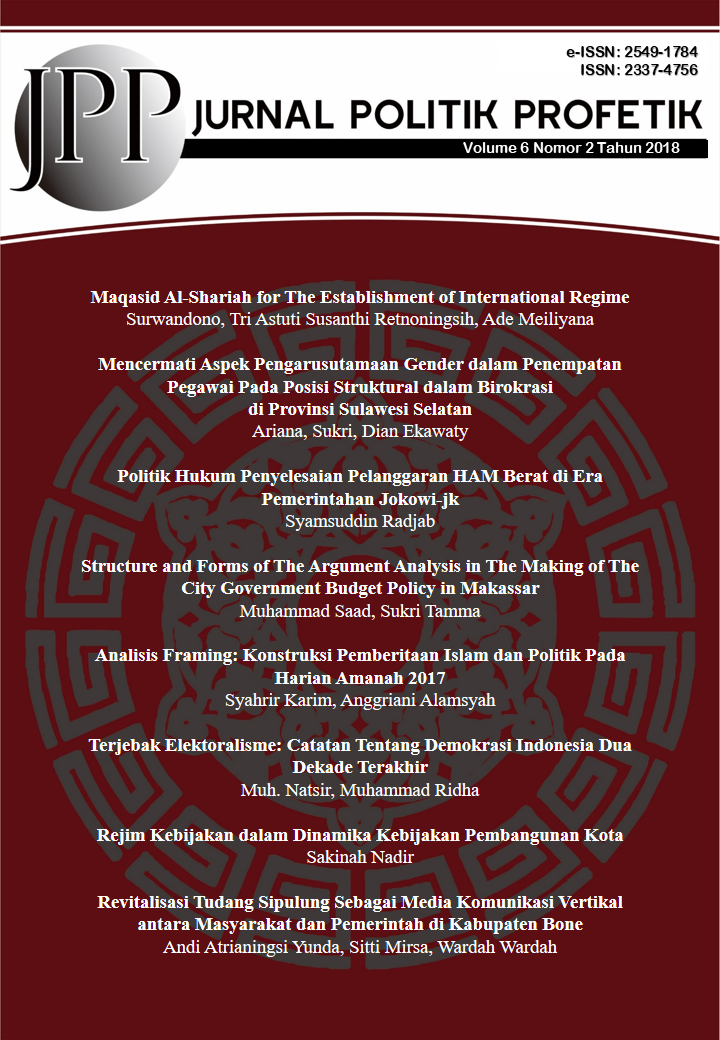REJIM KEBIJAKAN DALAM DINAMIKA KEBIJAKAN PEMBANGUNAN KOTA
Abstrak
This paper aims to show importance of the Urban Regime Theory in observing and analysing political dynamics in urban area development policies. Based on some research studies that done by some scholars, this paper shows fact that in context of the urban development policies, there is actor who playing very dominant roles more than others. Although there are various actors with different backgrounds and but the policy still dominate by the dominat actor. This actor is ultimately influences direction and inclination of a development policy in the urban area that is called as the Urban Regime.
##plugins.generic.usageStats.downloads##
Referensi
Caporaso, James A. dan David P. Levine, Teori-Teori Ekonomi Politik. Pustaka Pelajar. Yogyakarta 2008.
Dahl A. Robert, 1999. On Democracy, Yale University Press.
Davies S. Jonathan, 2002. Urba Regime Theory a Normative Empirical Critique. Journal of Urba Affairs. Volume 24, Number 1, pp. 1–17.
Department of Economic and Social Affairs, 2013. World Economic and Social Survey, Sustainable Development Challenges. United Nation.
Duverger, Maurice, 1987, Sosiologi Politik, Jakarta : Rajawali Pers.
Galland, Daniel & Stig Enemark, 2013. Impact of Structural Reforms on Planning Systems and Policies: Loss of Spatial Consciousness?. The European Journal of Spatial Development. Pp. 1-43.
Gibbs, David Gibbs and Andrew E.G. Jonas, 2000. Governance and regulation in local environmental policy: the utility of a regime approach.
Geraint., 1969, Political Elite, London:George Allen and Unwin.
Grodach, Carl, 2011. Before and After the Creative City: The Politics of Urban Cultural Policy in Austin, Texas. Journal of Urban Affairs. Volume 34, Number 1, pages 81–97.
Grubović, Ljiljana V. 2004. New institutionalism as a new theoretical framework for urban political analysis. Spatium 2004 Volume , Issue 11, Pages: 41-47.
Held, David and Anthony MC (et.all.), 1999. Global Transformations, Politics, Economics and Culture. Stanford University Press, California.
Komisi Dunia untuk lingkungan dan Pembangunan, Hari Depan Kita bersama. 1999. Gramedia. Jakarta.
Levy, David L. dan Aseem Prakashk, 2003. Bargains Old and New: Multinational Corporations in Global Governance. Business and Politics, Vol. 5, No. 2, August.
Neill, Jhon O. 1993, Ecology, Policy and Politics : Human well-being and the natural world. Routledge. London 1993.
Parsons, Wayne. 2008. Public Policy : Pengantar Teori dam Praktik Analisis Kebijakan. Kencana, Jakarta.
Rachbini, Didik J. 2004, Ekonomi Politik Kebijakan dan Strategi Pembangunan. Granit, Jakarta.
Rotmans, Jan et.al. 2000. An Integrated Planning tool for Suistainable cities. Environemental Impact Asessment review 20 (2000). Pp. 265-276.
Socio, Mark De, 2007. Business Community Structures and urban Regimes : A Comparative Analysis. Journal of urban Affairs, Volume 29, Number 4, pages 339–366.
Stone, C.N., 1989. Regime politics. Lawrence: University Press of Kansas.
…………… & H. T. Sanders (Eds.), 1987. The Politics of Urban Development (pp. 269–290). University Press of Kansas.
…………... 1980. Systemic Power In Community Decision Making. American Political Science Review, 74 (4). Pp.978-990.
…………… 1993. Urban Regimes and the Capacity to Govern: A Political Economy approach. Journal of Urban Affairs, 15, 1–28.
Thomas, A. (2004) The Study of Development. Paper prepared for DSA Annual Conference, 6 November, Church House, London.
Todaro ,Michael P. 1998, Pembangunan Ekonomi di Dunia Ketiga. Erlangga, Jakarta.
Zuindeau, Bertrand. 2006 Spatial Approach to Sustainable Development: Challenges of Equity and Efficacy. Journal of Regional Studies, Vol. 40.5, pp. 459–470, July.















